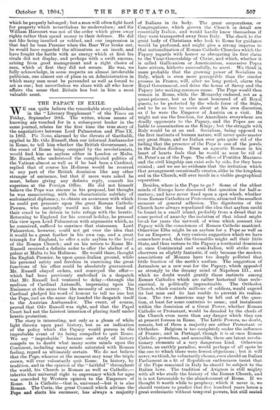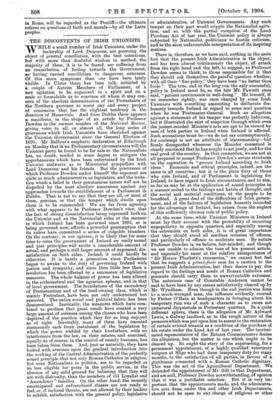W E can quite believe the remarkable story published in the
"Literary Supplement" of the Times on Friday, September 30th. The writer, whose means of knowing are vouched for in a subsequent leader in the same journal, relates for the first time the true story of the negotiations between Lord Palmerston and Pius IX. in 1862. Pie Nono, alarmed by the threats of Garibaldi, applied to Mr. Odo Russell, then our informal Ambassador in Rome, to tell him whether the British Government, in the event of Rome being occupied by the revolutionists, would find him an asylum either in London or Malta. Mr. Russell, who understood the complicated politics of the Vatican almost as well as if he had been a Cardinal, replied that of course his Holiness would be received in any part of the British dominion like any other stranger of eminence, but that if more were asked he must, before giving any definite reply, consult his superiors at the Foreign Office. He did not himself believe the Pope was sincere in his proposal, but thought he was manceuvring, with the characteristic subtlety of ecclesiastical diplomacy, to obtain an assurance with which he could put pressure upon the great Roman Catholic Powers, who naturally would not like the head of their creed to be driven to take refuge with the heretic. Returning to England for his annual holiday, he pressed this view upon Lord Pahnerston with arguments which, as he conceived, sufficed to convince that statesman. Lord Palmerston, however, could not get over the idea that it would be a great feather in his own cap, and a great triumph for England, to offer a safe asylum to the head of the Roman Church ; and on his return to Rome Mr. Russell received a definite order to offer the shelter of a palace at Malta to his Holiness. He would there, thought the English Premier, be upon quasi-Italian ground, while his personal safety and freedom in exercising the great functions of his office could be absolutely guaranteed. Mr. Russell obeyed orders, and conveyed the offer— which had been previously embodied in a despatch that Mr. Russell had ventured to delay—through the medium of Cardinal Antonelli, impressing upon his Eminence at the same time the necessity of secrecy. The Cardinal pledged his word of honour to tell no one but the Pope, and on the same day handed the despatch itself to the Austrian Ambassador. The event, of course, proved that Odo Russell was right, and that the Papal Court had not the faintest intention of placing itself under heretic protection. The story is interesting, not only as a gleam of white light thrown upon past history, but as an indication of the policy which the Papacy would pursue in the improbable event of its being compelled to quit Rome. We say " improbable " because our study of history compels us to doubt what many acute minds upon the Continent, including many minds saturated with Roman feeling, regard as ultimately certain. We do not believe that the Pope, whoever at the moment may wear the triple crown, will ever voluntarily quit Rome. In history, by tradition, and in the opinion of the " faithful " throughout the world, his Church is Roman as well as Catholic,— inherits that universal right to supremacy which for ages was conceded by Western opinion to the Emperors of Rome. It is Catholic—that is, universal—but it is also Fuomom. The Curia, the great Council which advises the Pope and elects his successor, has always a majority of Italians in its body. The great corporations, or Congregations, which govern the Church in detail are essentially Italian, and would hardly know themselves if they were transported away from Italy. The shock to the great body of Christians who look to Rome for guidance would be profound, and might give a strong impetus to that nationalisation of Roman Catholic Churches which the Papacy regards with horror as abrogating its first claim to the Vicar-Generalship of Christ, and which, whether it is called Gallicanism or Americanism, successive Popes have striven, hitherto successfully, to avert. We think ik more probable that the growing power of Socialism in Italy, which is even more perceptible than the similar process in France, will, after no long period, alarm the Royal Government, and drive the house of Savoy and the Papacy into making common cause. The Pope would then remain in Rome, while the Monarchy endured, not as §, quasi-prisoner, but as the most honoured of all Royal; guests, to be protected by the whole force of the State, and to be as free to move about at his own discretion, as if he were the Emperor of Austria on a visit. He might not use the freedom, for Anarchists everywhere are deadly opponents to the Papacy, and the Popes are ae liable to assassination as the Kings ; but the struggle with: Italy would be at an end. Socialism, being opposed to the first instincts of human nature, will never quite master any great State, and no Italian ever gets quite rid of the feeling that the presence of the Pope is one of the jewels, in the Italian diadem. Even an agnostic Roman in his heart of hearts feels that he would as soon be rid of St. Peter's as of the Pope. The office of Pontifex Maximus and the civil kingship can exist side by side, for they have existed ; and we see no evidence that the irritation which that arrangement occasionally creates, alike in the kingdom and in the Church, will ever result in a visible geographical separation.
Besides, where is the Pope to go ? Some of the ablest minds of Europe have discussed that question for half-a- century, and have never fixed upon a spot which, whether from Roman Catholics or Protestants, attracted the smallest measure of general adhesion. The dignitaries of the Church have always repudiated the idea that asylum could be found in a small island, probably from a dread that in some period of anarchy the isolation of that island might break for years the network of wires which connect the Papacy with the consciences of Roman Catholic mankind. Otherwise Elba might be an asylum for a Pope as well as for an Emperor. A very curious suggestion which we have somewhere read, that the Grunaldis might sell their little State, and thus restore to the Papacy a territorial dominion at once Continental and semi-Italian, will strike most observers as slightly fantastic, if only because the modern associations of Monaco have too deeply polluted that little fraction of the earth's surface. The suggestion of Jerusalem as a new seat for the Papacy, which appealed so strongly to the dreamy mind of Napoleon III., and which no doubt would gratify those instincts among Roman Catholics which are rather historical than eccle- siastical, is politically impracticable. The Orthodox Church, which controls millions of soldiers, would expend its last man and its last rouble to prevent its realisa- tion. The two Americas may be left out of the ques- tion, at least for some centuries to come; and instalment within the dominion of a Great Power, whether Roman Catholic or Protestant, would be dreaded by the chiefs of the Church even more than any danger which they can at present foresee in Rome. The Little Powers, no doubt, remain, but of them a majority are either Protestant or Orthodox. Belgium is too completely under the influence of France; and in Portugal, though it is at once Roman Catholic, powerless, and accessible, there are latent revolu- tionary elements of a very dangerous kind. Otherwise Cintra, an earthly paradise, would perhaps of all spots be the one to which there were fewest objections ; but it will never, we think, be voluntarily chosen, even should an Italian Parliament in a fit of Republican enthusiasm insist that if the Pope remained in Italy he should be subject to the Italian laws. The tradition of Avignon is still mighty with all who study the history of the Roman Church, and it is not favourable to the abandonment of Rome. If we thought it worth while to prophesy, which it never is, we should venture to predict that five hundred years hence a great ecclesiastic without temporal powers, but still seated in Rome, will be regarded as the Pontiff—the ultimate referee on questions of faith and morals—by all the Latin peoples.











































 Previous page
Previous page